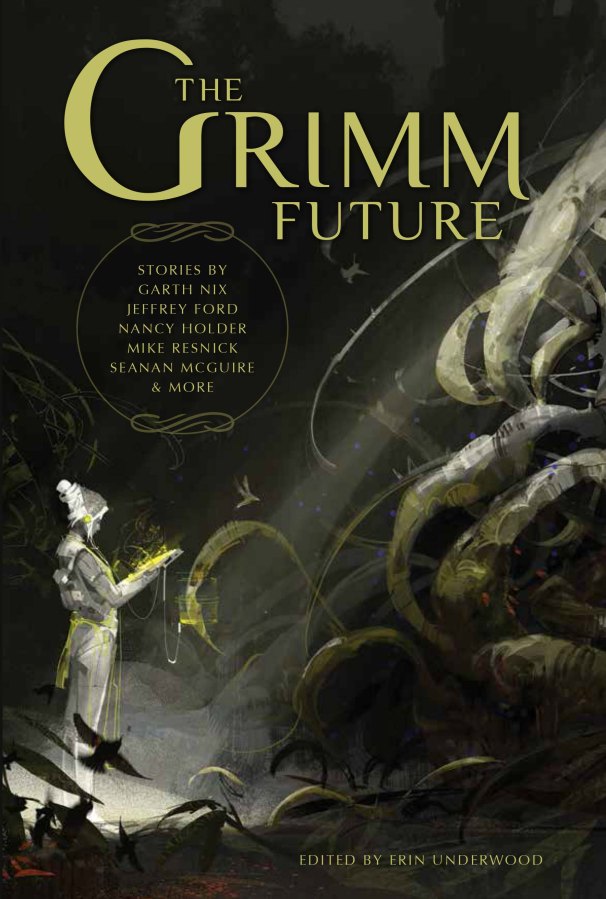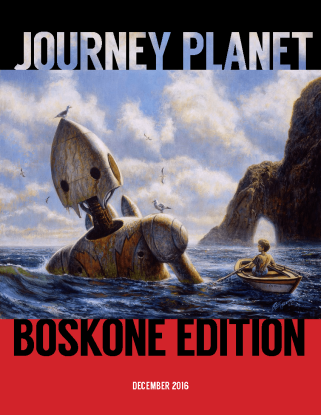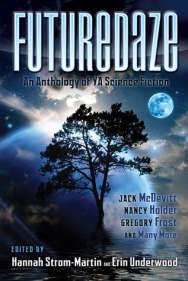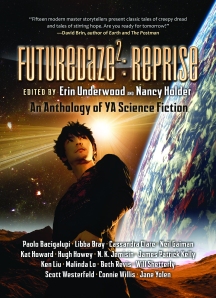 Underwords has had the special opportunity to interview award winning fantasy writer David Anthony Durham, author of the acclaimed Acacia series. It is always so much fun to interview a person like David. Not only is he witty and talented, he is also a generous writer who has a great deal to share as he discusses his work on The Sacred Band, his writing career, and his family’s recent move to Scotland.
Underwords has had the special opportunity to interview award winning fantasy writer David Anthony Durham, author of the acclaimed Acacia series. It is always so much fun to interview a person like David. Not only is he witty and talented, he is also a generous writer who has a great deal to share as he discusses his work on The Sacred Band, his writing career, and his family’s recent move to Scotland.
David Anthony Durham received his M.F.A. in creative writing from the University of Maryland, and he currently teaches Popular Fiction in the Stonecoast MFA Program through the University of Southern Maine. He and his family live in Scotland. You can visit David online at http://www.davidanthonydurham.com/ as well as on Facebook.
~
Before writing the Acacia series, you were most well known for your historical fiction Gabriel’s Story, Walk Through Darkness, and The Pride of Carthage? – all of which are award winning or noteworthy novels. What inspired you to write an epic fantasy trilogy, which has since been compared to the likes of J.R.R. Tolkien and George R.R. Martin?

It’s simple, really. I read fantasy as a kid. I discovered a love of reading in Middle Earth and Narnia and Earthsea. I forgot about that for a while as I worked through an MFA and built a “literary” career, but I came back to fantasy when I saw how much it was becoming a part of my kids’ life. I watched them and went, “Yeah… I remember being that excited about a book. I want some of that feeling back.”
I think we should honor that–to some degree or another–as adults. I wish more literary writers would acknowledge this. I’ve heard many of them admit to the same love of fantasy as children, but they only do so after some prodding–as if I have to pull the old memories up from wherever they’ve buried them.
The transition from historical fiction to epic fantasy seems like a big step for a writer to take. What was it like to transition from historical to fantasy fiction? How did the two writing experiences conflict or conform to each other?
 Historical fiction made for a great base from which to launch into fantasy. I’d just come off dealing with lots of large-scale issues with Pride of Carthage, and I used that experience as I began to build my fantasy world. Many of the things I covered in that novel I wanted to cover in Acacia: The War With The Mein, also. I think it helped create an imagined world that feels lived in and tangible. I hope it does, at least.
Historical fiction made for a great base from which to launch into fantasy. I’d just come off dealing with lots of large-scale issues with Pride of Carthage, and I used that experience as I began to build my fantasy world. Many of the things I covered in that novel I wanted to cover in Acacia: The War With The Mein, also. I think it helped create an imagined world that feels lived in and tangible. I hope it does, at least.
The main transition I was aware of was that I began with a fairly low-magic world with the first book. I wanted magic to become a larger part of the world as the novels progressed, so that by the end it was a much more full-fantasy than at the beginning. That made sense to me, but it also allowed me to grow more comfortable writing about fantasy creatures and actions as the novels progressed.
The books grow more fantastical. So did I as a writer.
The Acacia series tackles a story of epic proportions with multiple main characters, plots, and locations. When writing The Sacred Band, what was your biggest challenge in bringing this story together in only three books?
The hard part was not giving in to the impulse toward gigantism. Near the end of The Sacred Band I had a crisis. I couldn’t bear the thought of ending the book in only a few more scenes. Instead of the ending I’d been writing toward, I was suddenly sure that I needed to expand, not wrap up. I wanted one more book, and I hastily sketched out exactly what that would entail. I wrote my editor an impassioned email explaining my reasoning and asking for his okay for a fourth book. When I wrote it, I couldn’t imagine any other option.
 How did he respond? He said the editorial equivalent of “No Freaking way, dude”. He felt strongly that I needed to finish it as a trilogy, and that my impulse to go longer meant that the story was getting away from me. He suggested I take a deep breath, come to grips with a trilogy again, and that he and I work together to grab the beast before it devoured me. He even suggested we push back the pub date by a year.
How did he respond? He said the editorial equivalent of “No Freaking way, dude”. He felt strongly that I needed to finish it as a trilogy, and that my impulse to go longer meant that the story was getting away from me. He suggested I take a deep breath, come to grips with a trilogy again, and that he and I work together to grab the beast before it devoured me. He even suggested we push back the pub date by a year.
I took about a half an hour to process this, and then responded with the authorial equivalent of “No freaking way, dude”. I wasn’t saying no to the trilogy, though. As soon as he called me on it, I knew I really could and should finish it as promised. That urge toward gigantism in epic fantasy is completely understandable. I mean, what gets an author more invested than creating an entire world and all the people in it? Of course we want to stay in those worlds for as long as we can! But that’s clearly not a good impulse in lots of ways, including that we drag stories out in ways that can be pretty self-indulgent–not to mention callous to our readers.
My editor said no, and I had to admit that he was right. I wasn’t going to push the publication back by a year. Instead, I proposed a new deadline–more like a couple of months away–and I said I’d write like a madman, day and night, awake and sleeping, until I was done. He agreed. I did that, and I’m very happy to say that he loved the novel I delivered.
It was a close call, though. If I’d held my ground I don’t know what would have happened. And if I’d taken that extra year… Either way, I was at the edge of a career crisis. I’m rather proud–and relieved–that I came through it in a manner that I’m pleased with. And that Doubleday is pleased with, too. They signed me for another book, and in this publishing climate that’s not something to take for granted.
Over the course of the series, which character has surprised you the most or developed furthest beyond your original concept?
Corinn. I knew at the beginning that she wasn’t as trivial as she seemed, but I didn’t know how she was going to face the things thrown at her. In each case, she makes decisions that readers have every right to think are wrong, but for me there’s logic to everything she attempts. It comes–as I think is true of many people–from the betrayals and disappointments that shaped her in her childhood. I found her wonderfully full of contradictions, full of flaws and strengths in equal measure. She was very rewarding to write, I think she might be the most complicated character in the series.
My favorite scene to read in The Sacred Band was Dariel’s last scene because of everything that moment represented. What was your favorite or the most compelling scene for you to write in The Sacred Band?
That’s nice to hear. Thank you.
For me, there’s no one scene. I could never pick one of them. I enjoy different ones for different reasons. Mena and Elya at war… Corinn with her dragons and the ghost that haunts her… Dariel discovering what the sacred band is… Another character that I shouldn’t mention by name shaping the future of the empire… A lot came to completion in this book. No one plot line is more important than another. They all feed into the whole.
Are there any characters in the series whose stories you would like to continue after The Sacred Band either as a second Acacia series or as a short story? If so, is there any chance we can convince you to write it?
 I could happily write lots of different standalone stories of various characters. All that needs to happen to convince me is for the series to sell well enough that publishers want to continue to publish me writing about this world. It depends on that more than anything–on readers.
I could happily write lots of different standalone stories of various characters. All that needs to happen to convince me is for the series to sell well enough that publishers want to continue to publish me writing about this world. It depends on that more than anything–on readers.
My father in law, on finishing the book, said that surely I had to write something that deals with the hounds after they’ve grown up. Forget about the people. He wants to see the hounds in action! I kinda do too, really. He suggested a title: The Hounds of Acacia.
We all make mistakes as writers. Some good, some bad. What was the best or worst writing mistake you ever made? What was it about that mistake that qualifies it for the best/worst title?
It’s something I had to work through, but I guess it qualifies as a mistake… Youthful “literary” arrogance. I had a healthy dose of it. I floated atop a mighty wave of it during grad school. I believed my work to be terribly important. Important enough that it was all right for me to punish readers with unrelenting grimness as they read it. I was grim. And arrogant in that I almost felt my fiction was medicine readers should thank me for tipping it down their throats.
I’m being a little simplistic. I also learned a lot about writing during my MFA program. But it wasn’t until a few years after that I really came to understand the most important thing about this process. Readers don’t owe me anything; I owe them a ton, though, and I better repay them as much as I can with stories that reward them. That’s what I try to do.
You and your kids have a great relationship. How has that fed into your writing? Has story time with the Durhams resulted in any new fiction or new ideas that you have incorporated into one of your novels? Do you see any children’s stories in your future?
 My kids are great. I love them a bunch and I’m happy to have spent so much of their childhood with them. They were homeschooled for the last five years or so. It was great. They’re both in school now and loving it, but I really do think having that longer period of time with each other has been wonderful for us.
My kids are great. I love them a bunch and I’m happy to have spent so much of their childhood with them. They were homeschooled for the last five years or so. It was great. They’re both in school now and loving it, but I really do think having that longer period of time with each other has been wonderful for us.
You bet they’ve affected my writing. Actually, since you ask… I have been writing for kids. With their help, I’m 150 pages into a middle-grade solarpunk epic fantasy novel. It’s set in ancient Egypt. We’ve been having great fun playing with the gods, with history, with bringing a magical version of the distant past to life. For the first time, Maya and Sage are my beta readers. They’re good at it, too!
This was a side project. I sort of slipped in the writing of it between other projects. When I first told my agent about it he was highly skeptical. I showed him different proposals and explanations of it, but he didn’t really get it. Eventually, he said, “Fine. Just give me the whole thing and I’ll read it. And then I’ll give you my honest, frank opinion.” He was clearly expecting that not to have a very high opinion, at least as translates into the project’s commercial potential–into it being worth my time as compared to writing other stuff.
He got back to me recently. He…loved it. He really, really liked it. Stay tuned. I’ll soon know if this thing has legs. Or wings, as the case may be.
You and your family recently moved to Scotland. How has it been settling into your new home? How has the move affected your writing?
My writing has become wetter and windier, with the baying of sheep an ever-present soundtrack. All my characters now drink whiskey and are mad for football (soccer). They all say, Alright, pal? This is a problem considering that I’m writing an historical novel about the Spartacus rebellion. Now I find that Crassus is an Arsenal fan, while Pompey is all Manchester United. And Spartacus, he supports Aberdeen, which is not exactly a winning proposition…
Okay. I’m joking, obviously. The only way I’m aware of it affecting my writing is that the move has been a long period of disruption. It’s tough getting my routine back. I don’t really have it yet. I’m not in my own space, and that’s making it a bit tricky at the moment. I’ll sort it out, though.
 Bunnies. Spartacus. Graphic novels. Oh, my! What more needs to be said? Do you think there is any chance that Clan Durham might collaborate on The Spartacus Bunny Wars, even as a fun little web project? Could be fun!
Bunnies. Spartacus. Graphic novels. Oh, my! What more needs to be said? Do you think there is any chance that Clan Durham might collaborate on The Spartacus Bunny Wars, even as a fun little web project? Could be fun!
I’d love to. I don’t know where the idea for The Spartacus Bunny Wars came from, but it cracks me up imagining gladiator bunnies in armor, smacking each other with carrots, turnips or–most frightening–beets. I see the guards whipping them into submission with garlic scapes, and the crowd roaring for carnage as they munch celery sticks.
It could definitely be fun.
What’s up with those Scottish cows that are peering inside through your kitchen window?
I wish I knew. It might just be that they like the smell of a good curry, but I fear it’s something more sinister. I just haven’t figured out what.
Now that you’re living in the UK, there is a cultural requirement that you have a favorite Doctor. Mine is 10 with Matt Smith’s Doctor coming in as a strong second. So I ask, the oldest question in the universe, the question hidden in plain sight, “Doctor Who?” Why that Doctor?
David Tennant? I don’t have any good reason other than I’ve watched more episodes with him in them than anybody else. I like him. He’s Scottish. That helps.
Everyone has a secret superpower. What is your superpower and what would be your superhero name? Okay, now ask your kids how they would answer that question for you. What did they say?
I am a shape shifter. I don’t mind admitting it. It’s not my fault. I was just born this way. My kids will tell you that same thing.
As to a superhero name… Now, that’s just silly.
David, thank you so much for taking the time to do this interview. As always, it has been an honor and a pleasure.
I’m honored. It’s been fun.







Both to Erin and David: I enjoyed this very much!
Thanks, Richard. Glad you enjoyed it. 🙂
Erin–You ask great interview questions! I’ve immensely enjoyed the Acacia series from page 1 of book 1 to the final words of book 3, so it was great to read David’s insights into some of his choices and preferences in this interview. It was fascinating to read his take on authors’ tendencies to continue expanding the world and the story. Of course, I would have gobbled up a book 4, but I like that David fought that tendency (with some help from his agent) and completed the trilogy as planned. What did you think about that answer? Would you like to see him return to Acacia in the future? Are there other fantasy series that you would have preferred to end after book 3 or book 5 or book 15? 🙂
It reminds me a little bit of the Lost producers’ choice to decide–and announce–during the third season (I think that’s right) that there would be exactly three more seasons. Sure, they could have kept adding on random subplots and character arcs, but those boundaries–transparent to the audience–really strengthened the show as a whole.
I thought David’s answer about keeping the series to three books was very interesting. I love reading series, and I love writers who write multiple series within the same world. However, it does drive me a little crazy to get emotionally involved in a series that keeps getting extended book by book without any clear idea of when a series will reach a resolution point, if not an end. I think David made a good decision to end the series with book 3, but I see lots of possibilities for a second series or new stories that can take place within the world of Acacia.
Well, it’s a big world–maybe there are things happening on the other side of the Acacia map that David will return to someday. I’d read it, that’s for sure! 🙂
Glad to hear it. I may force you to do that one day!
Pingback: SF Signal: SF Tidbits for 10/17/11
Pingback: The Great Geek Manual » Geek Media Round-Up: October 17, 2011
As if I didn’t like David before, now I find out he’s a Tennant fan. Author for the win!
Another great interview. The more I read about this world and about this author, the more I can’t wait to dive into this series. Already bought the first book and now just need to find time to read it!
Smiles!
Lori
No no no David and Erin ~ it’s Christopher ECCLESTON closely followed by David Tenant . . . VERY closely followed by Captain Jack . . . mmmm . . . .
I like Christopher too. He’s… a close second for me.
Hi David! I’d talk to you, but I’m way too envious that you’re living in Scotland again 😉 ~ but cheers and congratulations all around ~ and happy holidays!